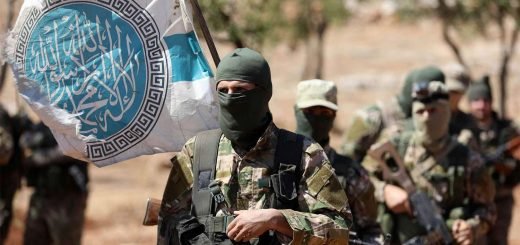Role of Media in the Russia-Ukraine Crisis
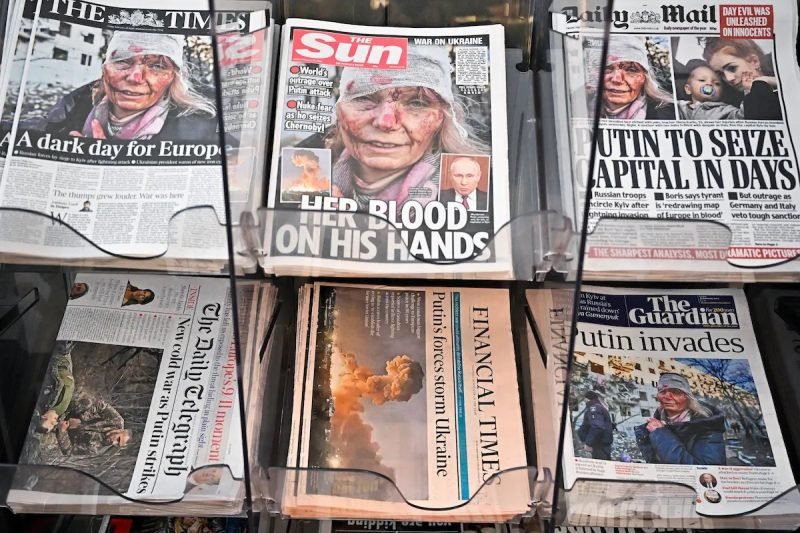
“Media is the most powerful entity on Earth”- Malcolm X
Significance of Media in the World Politics
Media is a very powerful element in international relations and it carries the power to decide what is right and what is wrong and how the world should view a story.
Unlike the cold war time when the world was led by two major power blocks, the current world order is being led by different individual entities. There is a great struggle for power in the contemporary world order and media is playing a major role in it. Media provides the world with different ways to view a story and it helps people decide answers to questions like who the aggressor is and who the victim is. Media projections of news events can be manipulated with radical views or by handing out misinformation. Also, different News media outlets are inclined towards different ideologies with some inclined to the left and some to the right and some being state-controlled and monitored. The different portrayal of the same news event makes people and states act in a certain way and take actions accordingly. [1]
It is important to notice that we are currently living in a post-truth world order. With the presence of Social media, ideas and radical views on an event can escalate very quickly leading people to different eco chambers and later to political insurgencies. The power of media or social media for that matter is very eminent and a great example of this is the Arab spring of 2011 or the recent Sri Lanka crisis.
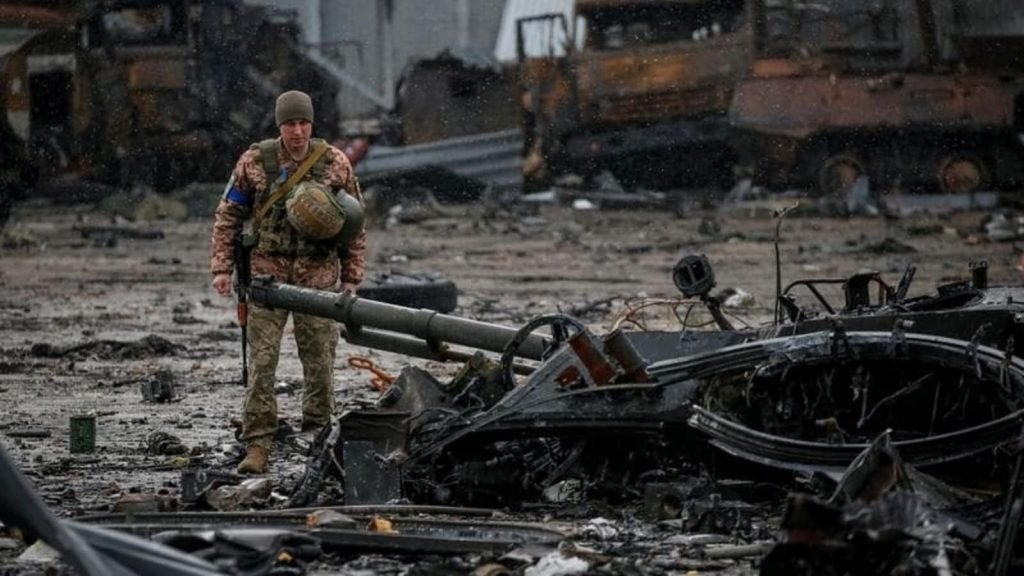
History of the Russia-Ukraine Crisis
Despite the fall of the Soviet Union in 1990, Russia a major part of the Soviet Union has played a great role in maintaining its power as one of the major block countries through its involvement in trade, through involvement in cooperation such as the Shanghai cooperation, and through its seat in UNSC. It is also a major supplier of oil and gas to Europe.
Being a powerful state, Russia has been facing security threats from the west because of the old bordering the Soviet Union states joining NATO and American forces patrolling around areas like the Russian – Poland border. Most of the previous soviet aligned as well as Warsaw pact countries like Hungary, Poland, and Bulgaria have also joined NATO. A major reason why Putin declared a ‘Special military operation’ on Ukraine, on 24th February can be looked through the threat Russia faces if Ukraine joins NATO or other major military deals.
Apart from the increasing expansion of the west, the crisis in Ukraine serves other purposes for Russia. It seeks to establish a Pro-Moscow government as during the presidency of Victor Yanukovych, and also establish its influence through disputed eastern areas of Ukraine like Donbas where there is an imminent presence of a population of Russian origin.
During the Russia Ukraine crisis, the world has also seen how an action taken against Russia has been an action against the world. The economic sanctions and trade restrictions put on Russia have resulted in the economic crisis in the west and an increase in inflation rates for its products.
The Russia – Ukraine crisis gives room for thought in deciding who is the aggressor or who the aggressor is, or in fact if actions taken by Russia were indeed a necessary evil. A major non-state actor that has been deciding what is right and what is wrong for us has been the media. In this current Russia – Ukraine crisis, Media has been playing a major role along with the other non-state actors like think tanks, arm dealers in giving different perspectives to war from Russian side, Chinese side, the Ukrainian or western side as well as from non-aligned states like India.
Russian Media Perspective
Unlike countries like China which use strict measures for media censorship, Russia focuses on handing out misinformation or blocking the information flow. Russia has access to monitor all private communications and has a long history of focusing on media in propagating and controlling the news.
Media is one of the biggest non-state actors in Russia and the utilization of media in spreading state propaganda can be seen very clearly in this current Russia-Ukraine war. An article titled ‘What Russia Should do with Ukraine’ by Timofey Sergeytsev in the Russian state-owned news agency RIA Novosti conveys extreme ideas. It talks about the need to ‘denazificify’ Ukraine by highlighting Ukraine’s military actions in eastern Ukraine during 2014 as similar to genocide by Nazi Germany. Through the article, Timofey Sergeytsev also says that Ukraine hasn’t been able to build up the concept of a nation-state throughout history and that any attempt to build a nation-state will result in ‘Nazism’. It also justifies acts of war during the Russia – Ukraine crisis as a means of taking away areas from Ukraine, which apparently support the Nazi ideology [2]. Another article called ‘Russia is responsible for Ukraine’s by Petr Akopov published in RIA Novosti talks about the fall of the Soviet Union in 1991 as a ‘tragedy’ and that Russia is currently building steps in the reunification of the former Soviet Union state [3]
Another prominent state-controlled news media outlet is the Russian Today. In a recent article that came under the feature section titled ‘Sent to certain death’: Why growing numbers of Ukrainian servicemen are refusing to fight on the Donbas frontlines’ by Petr Lavrenin says that Ukraine forces serving in the Donbas region of Ukraine are leaving their post due to lack of aid or support from the government of Ukraine. [4]
By looking at state-owned media websites of Russia, it can be seen that a one-sided story is being portrayed in favour of Russia. Most of the content is published without giving references which makes it hard for fact-checking and since the media is state-controlled, Russia is always shown in a positive light. These news articles mostly project radical views supporting Russia and are written in a way such as to accelerate radical thinking and the views pre-existing in people.
However, despite the control of Media by Russian authorities, people involved in news media have been protesting the concept of state-controlled media. During this ongoing Russia – Ukraine war, various Russian journalists have been seen quitting on live TV. A famous incident was when ‘Marina Ovasyannikova’ who was the editor for ‘channel one’ put an anti-war sign live on air that read “They are lying to you here”
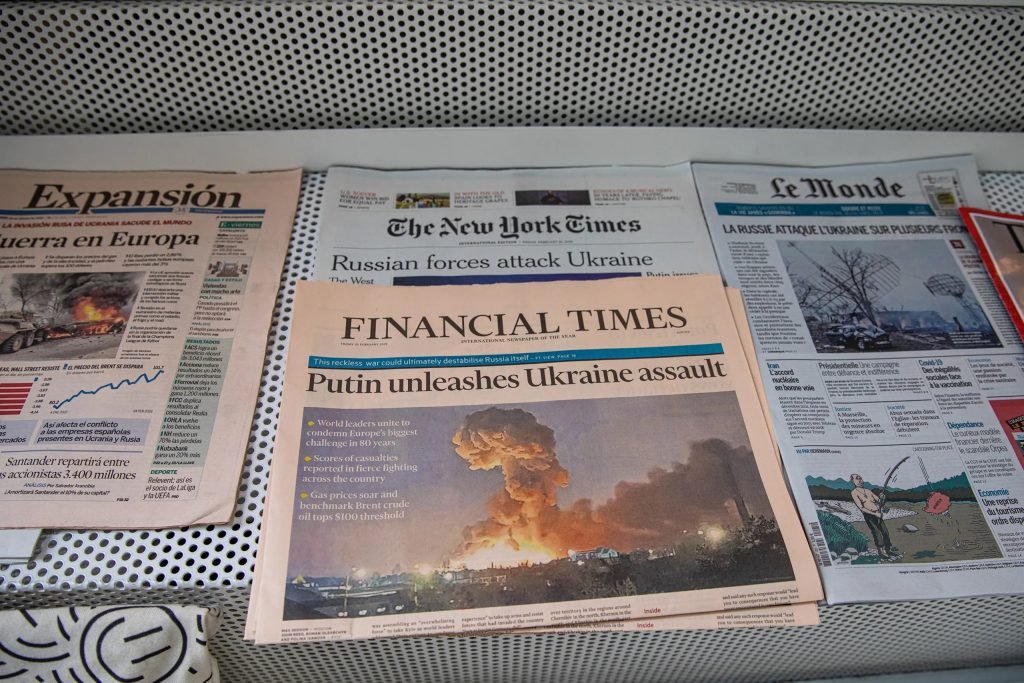
Ukraine and Western Media Perspective
Despite a section of people hailing Russia’s action in Ukraine as a ‘necessary evil’, there has been an increasing disagreement against it. A reason for this is the media’s projections of the war by the western media, touching upon human sentiments. An example for this is the media projections of President Zelenski, who often uses emotional pleas to gain different nations’ support. During his speech to the congress, he appeared to be very disappointed and emotional. In that emotional plea, he talked about how the current Russia – Ukraine crisis was similar to the Pearl Harbour incident in America.
Apart from the portrayal of news, an organization called ‘stop fake org’ was formed in the year 2014 by a joined efforts of students, professors, and alumni of ‘KyivMohyla Academy’ to stop the spread of fake news. An article titled ‘From “Destroy the Nazis” to “Destroy the Ukrainians”: how Kremlin propaganda has changed in two months of the war’ explains how Russia used media to influence the narrative on the crisis. According to Stopefakeorg, some of the fake propaganda by Russian media included the alleged development of biological weapons that was taking place in Ukraine’, the usage of the article 51 of UN Charter by Russia to justify its actions on claims of self-defense and how Ukraine bombed its own cities to blame Russia for the same. It also talked about a campaign called ‘Stop hating Russian’, which was allegedly made prominent through bots and usage of algorithms[5]
Stopfakeorg can be seen as a counter-effective method to media projections by Russia. However, there is a possibility of stopfakeorg being used as a way to show Russia in a bad light. Most of its recent articles were on fake news being spread by the kremlin. Moreover, the main sponsors for the project of stopfakeorg include organizations like ‘US National endowment for Democracy’, ‘The German Marshall fund’ etc.
News media outlets like the Radio Free Europe which works on spreading information in restricted areas are also currently being financed by the US congress. At the beginning of the Russia –, Ukraine Crisis, Radio Free Europe shut down most of its operations, and one of the reasons they said was that it was due to a law signed by Putin to jail journalists that spread fake news on Russia –Ukraine crisis. Here we can see how the west plays a major role in investing in media and countering Russia in terms of the spread of information
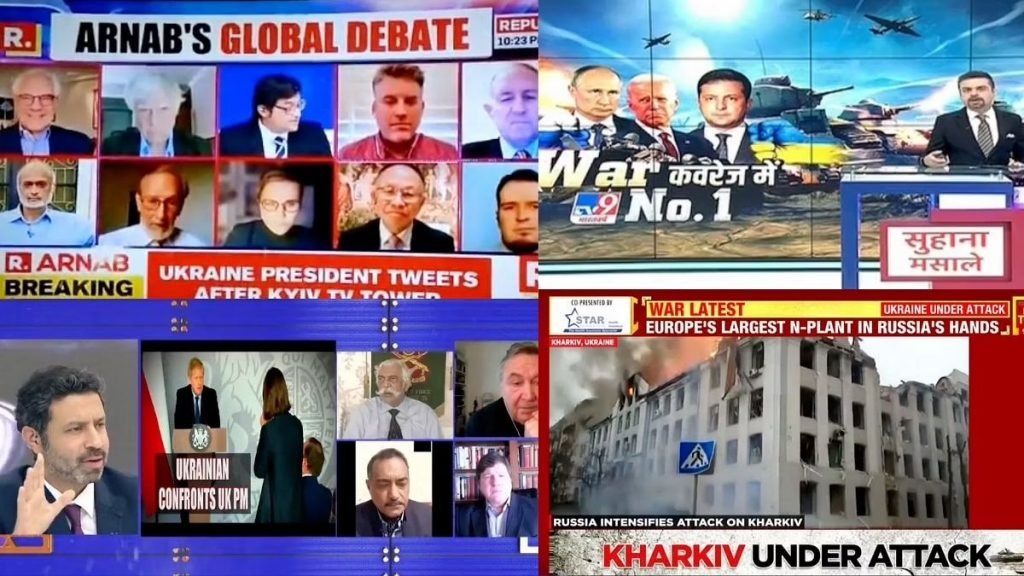
Indian Media Perspective
One of the key foreign policies of India is that of having a non-aligned status. India is a state that is neither allied to the west, nor to the east. This non-aligned status of India has led India to abstain from voting in the United Nations General assembly against Russia. This non-aligned status has often reflected the way in which various news media outlets of India portray news neither in support or nor against Russia or Ukraine. However, there is bias with some media outlets being leftist or rightist.
The best media outreach that Indian got during the Russia –Ukraine crisis was in conveying the struggles Indian students studying in Ukraine universities were facing. During the initial days of the Russia – Ukraine crisis, social media was flooded with videos and messages by Indian students conveying the hardships they were facing.[6] This was one major instance that impacted the response by India, influencing the PM Modi to call Putin and recommend him to resorting to diplomatic dialogues and safe passage of Indian students.[7]
Conclusion
Throughout the Russia – Ukraine crisis, the world has seen different portrayals of events. Different countries have taken different stances against the Russia – Ukraine crisis and it can see seen through their media portrayal of the same. China, which silently supports Russia for its interests in Taiwan as well as being an ally to Russia against western countries has been alleged in spreading Pro Russian tweets through its social media platform called Weibo.[8] China however in terms of using its major state-controlled media hasn’t been much biased in portraying events on the Russia – Ukraine crisis
Apart from the different political narratives of the Russia – Ukraine crisis, media projections of the same have vastly ignored the humanitarian crisis. Various citizens of Ukraine have been dead and injured, millions have become refugees, and instances of rape and war crimes have been reported.
Media is a very powerful element in today’s society. In this modern age of digitalization and the spread of social media, it is very easy for any citizen to fall victim to algorithms and later into echo chambers. With different political narratives and media bias in conveying world events, people can be easily confused in shaping opinions and responding to the crisis. The current Russia – Ukraine crisis has been a lesson to the world on how media through its various elements can impact our ideologies and beliefs and make us view an international event the way different blocks or states desire.
References
[1] https://www.tandfonline.com/doi/full/10.1080/23753234.2021.1945936
[2] https://ria.ru/20220403/ukraina-1781469605.html
[3] https://ria.ru/20220326/otvetstvennost-1780162615.html?in=t
[4] https://www.rt.com/russia/557314-ukrainian-soldiers-frontline-donbass/
[5] https://www.stopfake.org/en/fake-turkey-wants-to-seize-part-of-russia-crimea-and-donbas/
[6] https://timesofindia.indiatimes.com/city/indore/russia-ukraine-crisis-students-launch-social-media-campaign-to-stop-painting-indians-in-a-bad-picture/articleshow/90333420.cms
[7] https://indianexpress.com/article/india/ukraine-crisis-pm-modi-dials-vladimir-putin-discusses-safe-evacuation-of-indian-nationals-7798081/
[8] https://www.bbc.co.uk/news/world-europe-61071243.


